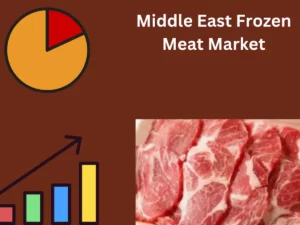© 2021 All rights reserved
Datavagyanik- Your Research Partner

Frozen meat has been gaining popularity in the Middle East due to several factors. First of all, many people choose frozen meat since it is sometimes more economical than fresh meat. Moreover, frozen meat has a longer shelf life than fresh meat, making it more desirable in areas where fresh meat availability may be constrained.

Also, consumers may have access to a wider range of selections with frozen meat. The ability to import frozen meat from all over the world has been made possible by developments in technology and transportation techniques, giving consumers access to a broader variety of meats, cuts, and preparations. This allows for greater cultural variation in food, which can be especially desirable in countries where specific types of meat are not typically consumed.
Another factor contributing to the popularity of frozen meat in the Middle East is the convenience factor. Busy lifestyles and work schedules can make it difficult for consumers to shop for fresh meat regularly. Frozen meat can be stored for longer periods, meaning that consumers can stock up on meat and have it readily available when needed, without having to make frequent trips to the market.
The growing popularity of halal-certified meat products is also expected to boost the market in the Middle East.
The introduction of packaged meat products has also had a positive impact on the market.
Saudi Arabia is the largest market for frozen meat in the Middle East, accounting for nearly half of the total market share.
The UAE is the second-largest frozen meat market in the Middle East, followed by Qatar, Kuwait, and Oman.
Beef is the most popular product segment in the Middle East, accounting for nearly half of the total market share.
Frozen meat is also seen as a more hygienic option in some cases. With strict regulations and standards in place for freezing and packaging, consumers can be confident that the frozen meat they purchase is free from harmful bacteria and pathogens.
Overall, the popularity of frozen meat in the Middle East is driven by a combination of affordability, convenience, and access to a wider variety of options. With continued advancements in technology and transportation, the popularity of frozen meat will likely continue to grow in the region.
Frozen meat refers to meat products that have been chilled to a temperature below the freezing point to preserve their quality and extend their shelf life. Customers in the Middle East frequently choose it, especially those who want a practical and affordable substitute for fresh meat.
Many meat products, such as beef, pork, chicken, and more, can be found frozen. One of the most popular frozen meat options is beef, which is offered in a range of cuts and dishes. Middle Easterners frequently eat pig, and frozen pork products like sausages, bacon, and ham are widely accessible. Another well-liked frozen meat alternative is chicken, which is available in whole, breast, wing, and other parts.
In the Middle East, frozen meat is offered in a range of retail outlets, including convenience stores, supermarkets, hypermarkets, and internet retailers. For customers who need to buy meat quickly and conveniently, convenience stores are a choice. Families and individuals who want to stock up on meat for extended periods frequently shop at supermarkets and hypermarkets since they provide a broader selection of frozen meat products to choose from. For customers who like to purchase from home and have their frozen meat items delivered right to their door, online businesses offer a convenient choice.
In addition to being a convenient option, frozen meat is often more affordable than fresh meat, making it a popular choice for budget-conscious consumers. Frozen meat products are also often sold in bulk, allowing consumers to purchase larger quantities and save money in the long run.
Overall, frozen meat is a convenient and cost-effective option for consumers in the Middle East, with a wide range of products available through various retail channels. As consumers continue to seek out convenient and affordable food options, the popularity of frozen meat is likely to continue to grow in the region.
The frozen meat market in Saudi Arabia is growing in popularity due to the high demand for convenience. With a growing population, more individuals are looking for easy and affordable ways to purchase frozen meat. With the availability of frozen meat, people can save time by not having to go to the butcher every time they want to purchase meat products. Furthermore, frozen meat is often more affordable than fresh meat, making it a great option for budget-conscious shoppers. Additionally, many frozen meat products are pre-packaged and ready to cook, making meal preparation easier and faster.
The frozen meat market in the UAE is growing due to the increasing demand for convenience and variety. With the availability of a large variety of frozen meat products, people no longer need to go to the butcher to purchase different kinds of meat. Additionally, frozen meat products are often cheaper than fresh meat products, making them a great option for budget-conscious shoppers. Furthermore, many frozen meat products are pre-packaged and pre-cooked, making meal preparation easier and faster. Additionally, frozen meat products are often of higher quality than fresh meat, making them a great choice for health-conscious shoppers.
The middle east frozen market has been segmented By Product Type and By Distribution Channel.
Based on the By Product Type, the middle east has a frozen market for Beef, Pork, and Chicken. In 2021, the frozen beef segment held a significant share. This was largely due to the rising demand for convenient and ready-to-cook frozen products. The segment saw high growth in the past year due to the pandemic, which impacted the global beef market. The trend is expected to continue into 2021 and beyond. The pandemic has caused significant disruption to the food supply chain, causing consumers to turn to frozen and shelf-stable items as an alternative. Additionally, frozen beef products provide convenience as they can quickly and easily be cooked without having to worry about spoilage. Furthermore, rising health consciousness has led to an increased demand for high-quality beef products, which are often found in the frozen segment.
Based on Distribution Channel, the market is classified as Convenience Stores, Supermarkets & hypermarkets, and Online. In 2021, the segment is expected to account for a significant share of Supermarkets/Hypermarkets. This is due to the increasing number of supermarkets and hypermarkets worldwide and the presence of a wide variety of frozen food products in these stores. Customers are attracted to the convenience of these stores, as well as the variety of products available. Additionally, the rising health consciousness among consumers has also been driving the demand for frozen food products. This demand is expected to continue to grow as customers look for healthier, more convenient options for their grocery shopping needs.
By Product Type
By Distribution Channel
By Region
“Every Organization is different and so are their requirements”- Datavagyanik







© 2021 All rights reserved
Datavagyanik- Your Research Partner
Add the power of Impeccable research, become a DV client